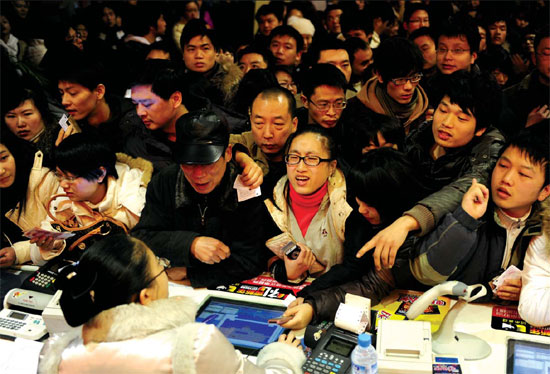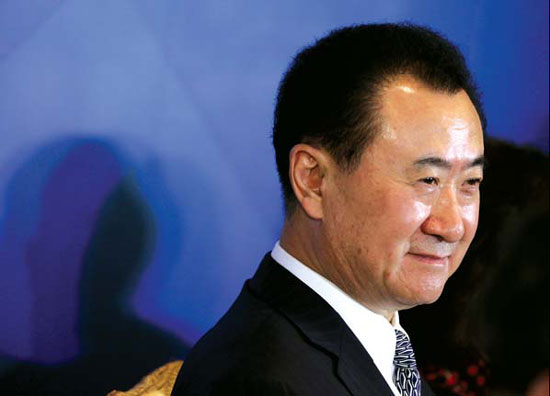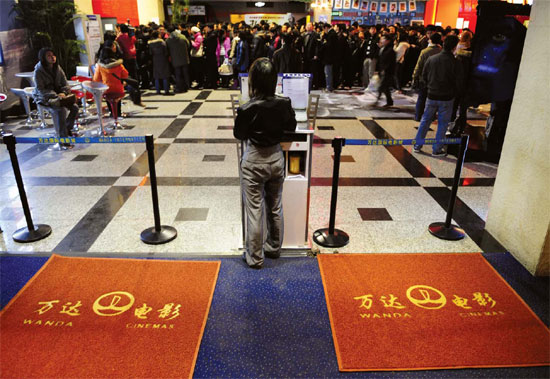Wanda Group ventures onto the global stage
Updated: 2013-01-03 07:56
By Liu Wei (China Daily)
|
|||||||||
|
An IMAX cinema that Wanda Group operates in Changsha, Hunan province, is a local attraction. Wanda Cinema Line holds around 15 percent of the market share on the Chinese mainland. Photos provided to China Daily |
|
Wang Jianlin, chairman of Wanda Group. |
|
A Changsha cinema of Wanda Group. The group has strong presence in cineplexes with IMAX screens both in the Chinese mainland and in the United States. Photos provided to China Daily |
Tycoon Wang Jianlin is moving fast, both in the United States and Beijing, to build a multifunctional conglomerate featuring film and TV, theater and theme parks, Liu Wei reports.
Eighty billion yuan ($12.8 billion): That's the annual revenue Wang Jianlin, chairman of China's Wanda Group, expects from his cultural business in the near future. On Dec 1, Wang announced the establishment of the Beijing Wanda Culture Industry Group, a branch of Wanda Group. With registered capital of 5 billion yuan and total assets of 31 billion yuan, the company is China's largest cultural enterprise.
The group has 11 companies, involved in nine fields, including Wanda Cinema Line, AMC Theatres - which it acquired in the US by September - Wanda Film & TV Media Co, Wanda Theme Park Co, Wanda Gallery and Popular Cinema, a film magazine.
"We have set a great goal for this company. In 2020 the revenue will reach 80 billion yuan, ranking within the global top 10 of cultural industry players," said Wang during a speech to the 11th China Entrepreneur Summit on Dec 7.
The ambitious plan might not be just a slogan. Roland Berger Strategy Consultants in Munich released its "Top 50 Global Culture Industry Players Study" in early December, ranking Wanda Group 37th on the list after Walt Disney Co, News Corp and Time Warner, for its cross-sectoral activity by annual revenue.
Wanda's high-profile in the cultural industry has been eye-catching. The conglomerate started as a property company and is now one of the most powerful players in the industry. Commercial property contributed 95.3 billion yuan of its total revenue of 105.1 billion yuan in 2011 and by the end of 2012, Wanda will exceed its target for annual revenue, 116 billion yuan, and will have 35 new Wanda Plazas, featuring shopping malls and cinemas, within two years, according to Wang.
But the Wanda chairman is obviously thinking about more than just land. Since 2005 the company has invested in the culture sector, beginning with the construction of cinemas in its commercial properties as evidenced by Wanda Plazas.
The first steps into the cultural industry, as Wang Jianlin recalled in an interview with Forbes Magazine earlier this year, were made by force of circumstance. At first, Wanda cooperated with Time Warner to build theaters, but a regulation released in late 2005 restricted foreign ownership of shares in theaters to less than 49 percent for each venture, which led to Time Warner's withdrawal from its theater business on the Chinese mainland. Then Wanda worked with Shanghai Media Group, but subsequent personnel changes at SMG saw that cooperation end. That was when Wanda decided to operate its own theaters and other cultural facilities, such as karaoke and theme parks.
Wanda's proceeds during those seven years have proved that the cultural industry creates big value. When Wanda entered the film industry in 2005, total box office revenue in China was only around 800 million yuan, but in 2011, that figure rose to 13 billion yuan nationwide and by November this year, the number had grown to 14.3 billion yuan. Wanda Cinema Line, which has 1,000 screens in China, holds market share of 15 percent.
The cultural sector will become a "pillar" of the group, said Wang during his speech in December. The government has also identified the cultural sector as one of the pillars of Chinese industry; at a meeting in 2011, the Party's central leadership defined culture as a pillar industry and a growth business in the nation's 12th Five-Year Plan (2011-15), and expects it to account for 5 percent of national GDP by 2016.
Polishing company image
|
Wanda's recent films include The Warring States, Holding Love and Warriors on the Rainbow: Seediq Bale. Photos provided to China Daily |
"Wanda has played a brilliant card with culture," said Chen Hu, a cultural industry analyst at Dongxing Securities. "The move not only helped to change Wanda's image from that of just a property developer into one of a cultural products maker, but also echoes the nation's craving for soft power and global exposure."
Wanda Cultural Industry Group's first official project will be a theme park located in Tongzhou, an eastern suburb of Beijing, which will feature film technology and entertainment. Beijing, defined as the nation's cultural center in the Party meeting, intends to further raise its cultural businesses' share of GDP from the current 12.8 percent. At the founding ceremony for Wanda's cultural group on Dec 1, Lu Wei, Beijing's deputy mayor, stood shoulder to shoulder with Wang.
"The government provides favorable policies for the use of land for cultural projects, so in this sense the Tongzhou project is a very smart move by Wanda," said senior movie producer, Wang Yu. "The company's sharp sensitivity and rich resources in the property industry, plus its extensive capital, will play critical roles in helping it to build a cultural empire."
Another major move Wanda has made to identify itself a significant player in the cultural industry was the acquisition of AMC, the second-largest US theater chain. Insiders believe the move reflects Wanda's deep understanding and rapid response to national policy.
In September, Wanda paid $2.6 billion for AMC Entertainment and its 5,048 screens in North America. It also plans to spend $500 million on theater renovations and technological upgrades.
"It is not likely Wanda will show Chinese films in these theaters any sooner," said Wang Guohua, director of the Cultural Industry Research Institute, affiliated to Beijing University of Technology. "The fact that the company now has powerful outlets in the US, allied to China's rise as a soft power, will help to promote Wanda globally as a cultural industry player."
Wang believes a critical test for Wanda's development of its cultural business will be whether it can produce quality content.
"This is so far the most urgent challenge Wanda has had to face to become one of the world's leading media groups, such as Disney and Warner Brothers," he said. "In the long term, the success of a cultural enterprise is evaluated not only by its revenue, but also its cultural products; works that touch, influence and change the way people look at the world."
Creativity and investment
Wanda is well aware of that factor. In the Forbes interview, Wang Jianlin categorized the most popular cultural products as "innovative, dramatic, entertaining, but not preaching".
The group claims to have invested $80 million to produce movies and television content. In 2011 it produced or co-produced six films, and plans to produce more than 10 films annually after 2013. If it meets the target, the company will become the largest producer of films and TV on the Chinese mainland.
Wanda has also worked with the Franco Dragone Entertainment Group in the US on preparation for staging shows in five major Chinese cities, that the Wanda chairman said will be equal to the best performances in Las Vegas. The first show, set to be staged in Wuhan, Hubei province, will premiere in 2014.
It is still too early to tell whether Wanda will produce great cultural works, but senior cultural critic Tan Fei is optimistic about the "cultural flagship", as the company has been nicknamed. "Wanda did not start as a cultural industry player, but as a property developer, so its capital and marketing ability is far better than most cultural companies on the Chinese mainland now," he said.
Ben Ji, a senior industry insider and marketing director of Reach Glory Media Group, hoped Wanda will gain experience from working with top US companies.
"Hollywood has produced the best in terms of universally favored cultural products," he said. "The productions involve subtle techniques and decades of experiences. Wanda's cultural enterprise, starting with its exhibition business, will benefit a lot from its global partners."
Contact the reporter at liuwei@chinadaily.com.cn
(China Daily 01/03/2013 page1)

 In Photos: 7.0-magnitude quake hits Sichuan
In Photos: 7.0-magnitude quake hits Sichuan
 Li Na on Time cover, makes influential 100 list
Li Na on Time cover, makes influential 100 list
 FBI releases photos of 2 Boston bombings suspects
FBI releases photos of 2 Boston bombings suspects
 World's wackiest hairstyles
World's wackiest hairstyles
 Sandstorms strike Northwest China
Sandstorms strike Northwest China
 Never-seen photos of Madonna on display
Never-seen photos of Madonna on display
 H7N9 outbreak linked to waterfowl migration
H7N9 outbreak linked to waterfowl migration
 Dozens feared dead in Texas plant blast
Dozens feared dead in Texas plant blast
Most Viewed
Editor's Picks

|

|

|

|

|

|
Today's Top News
Live report: 7.0-magnitude quake hits Sichuan, heavy casualties feared
Boston suspect cornered on boat
Cross-talk artist helps to spread the word
'Green' awareness levels drop in Beijing
Palace Museum spruces up
First couple on Time's list of most influential
H7N9 flu transmission studied
Trading channels 'need to broaden'
US Weekly

|

|












